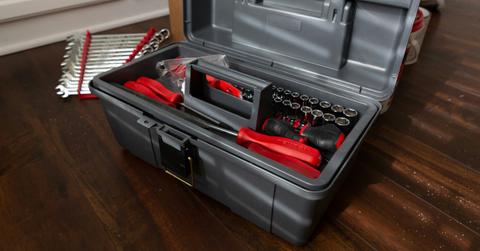This Surprising Compound May Be Stinking up Your Tool Bag
If you catch a whiff of something gross in your tool bag, there may be a surprising culprit behind the stench.
Published Dec. 10 2024, 1:48 p.m. ET

If you've ever opened your toolbox to grab your trusty screwdriver only to find yourself greeted by a powerful odor, you may have experienced the phenomenon of a stinky toolbox.
While it may seem easy enough to blame the tools — not only do they get dirty during use, but our hands leave sweat, grime, and oils behind every time we pull them out — there's something else behind the smell.
You can learn more about what is making your tool bag smell bad below, including the interesting scientific explanation for what's going on in the dark recesses of your tool pouch when your screwdrivers and other tools are not in use, and what you can do about it.

Why is my tool bag or toolbox smelling bad?
To solve the mystery of the smelly toolbox, all we have to do is look to science. Or, more accurately, chemistry.
According to the Hot Rod blog, the stench in your toolbox is the Cellulose Acetate Butyrate (CAB) used in the plastic handles of some of your favorite pieces. CAB is a thermoplastic that is a favorite amongst tool manufacturers thanks to its ability to stay clean and hold up to repeated use.
You're most likely to find CAB used in tools with clear or iridescent handles.
As for the reasoning behind the smell, that has to do with how CAB breaks down over time. You see, the aging compound releases certain types of acids (like butyric and free acetic) as it ages, which get trapped in the toolbox while it's closed, allowing everything inside of it (and the box itself in some cases) to absorb the smell.
Here's how to clean a tool bag:
How you clean your tool bag will depend on the materials, according to the Toolden blog. Those bags that are made with machine washable fabrics like nylon or canvas can typically be tossed into the washer on a regular cycle setting.
Of course, before you get ready to add one to your next laundry load, you'll need to take a few things into consideration. First, you'll need to completely empty the bag and check it for any spills or messes that shouldn't go into your washing machine.
Those include chemicals and compounds like motor oil and gasoline. Secondly, before putting your tool bag into the washer, you may want to rinse it or pre-treat it with a mild laundry detergent and a scrub brush.
For bags that cannot go into the washer, you can do this step and then hand wash the bag after. Don't forget to rinse the bag completely before letting it air dry! Leftover soapy residue can attract dirt, which may lead to your bag getting even dirtier.
For bags that can't be washed with water, you'll need to take more specialized steps and may even need a fabric-specific cleaner to safely get the job done without destroying your tool bag in the process.
Here's how to clean a toolbox:
Just like tool bags, different toolbox materials require a slightly different approach. According to the RC Industries website, a stainless steel toolbox may be okay to clean with a combination of water and dish soap applied with a damp rag and then wiped dry.
If you want a more thorough clean, you may want to get a stainless-steel-specific cleaner, which can also help polish the box.
Depending on the messes you're cleaning, you may also need to invest in different cleaners. For example, if you have an oily mess left at the bottom of your box, you may want something specially designed to cut through grease. You can eliminate a surface-level mess by using mild soap alone.
Here's how to clean your tools:
If you want to keep the smell from permeating your tool box, your first step should be to isolate the stinky tools and give them a good scrubbing.
While the cleaning won't stop the release of the acids, it will give you a properly prepped surface, which is where the next step comes in, according to the Hot Rod blog.
Paint your tools with a shellac or other sealant, which will keep the CAB's smells locked into the handles where they belong.
If you can't shake the smell even after you've covered the handles, you may want to consider donating the tools instead of tossing them. There are plenty of people who would rather see the smelly tools taking up space in their tool bags instead of andfills, especially if they don't find the smell as noxious.
